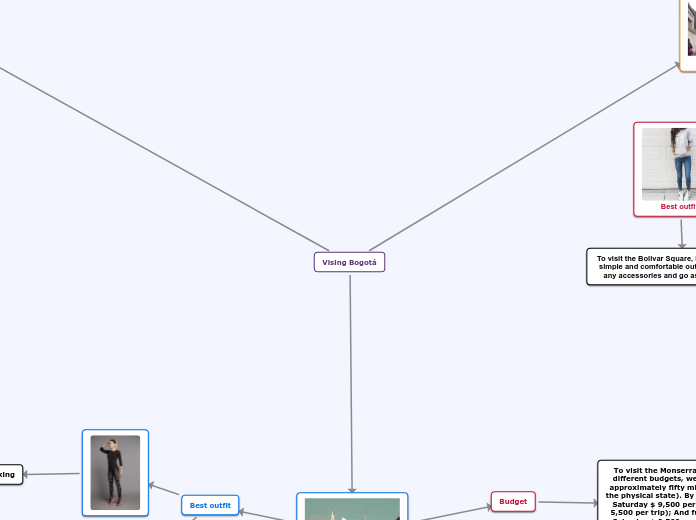av Alejandra Carvajal för 6 årar sedan
486
Vising Bogotá

av Alejandra Carvajal för 6 årar sedan
486

Mer av detta
To leave from the Pontificia Universidad Javeriana we take the circunvalar avenue to the south and then straight to the Monserrate hill.
To leave the Pontificia Universidad Javeriana we walk to the shopping center Plaza 39 (Diagonal 40a with carrera 7). At this bus stop we wait for the C12A to San Blas, until stop number 11 and we walk 2 minutes to the Monserrate station.
Due to the burning, felling and planting of foreign species such as pine and eucalyptus, most of the fauna that populated this place has disappeared. In the secondary redoubts there are small mammals such as forest mice, nectarivorous bats, marsupials, weasels and foxes; and about 58 species of birds in what corresponds to the high Andean forest. In the low Andean forest there are some weasels, runchos and canids. As for the birds there are black mirla, swallow, kestrel, chirlobirlo, copetones, cucaracheros and variety of hummingbirds.
Cable car
Funicular
Walking
I do not recommend driving because the 7th road becomes pedestrian and it is difficult to access and park the vehicle. In the same way, you must take the 7th road northbound south until you take the 13th race, for the 13th race you turn left on 19th street and then on the 8th race to the right. Take the whole 8th road until you reach 10th street and get to the Bolivar Square.
From the Pontificia Universidad Javeriana we walk to the stop of the 7th and 42nd streets and took the T12 bus to Quintas del Sur to the stop of 9th street with 10th street, exactly the number 12 stop since we got on the bus. From here we walk for 6 minutes and arrive at the Plaza de Bolivar
Among the diseases that pigeons suffer is also coryza, which is very common between autumn and the beginning of spring. It is an acute respiratory infection that is linked to factors such as cold, humidity, overcrowding or stress caused by competitions, and also to vitamin A deficiency. It produces: sneezing, watery nasal discharge that then becomes sticky and purulent, difficulty breathing, so the animal must keep its beak open.
As a student of microbiology, I am interested in identifying the possible microorganisms that attack pigeons, among the most common is trichomonas, it is estimated that up to 80 percent of adult pigeons coexist in balance with the protozoan that causes this parasitic disease. The signs of this is apathy, bristling plumage, viscous diarrhea, lack of appetite, intense thirst, thinning, hard plaques, yellowish-white, throat and, in some cases, navel and finally breathing difficulties.
Salmonellosis (Paratifosis), is a bacterial infection of the intestine mainly afflicts young pigeons and birds, causing an early death. But pigeons that heal can become carriers and transmit the disease through the shell of the hatching eggs when they reach adulthood. Affected individuals may present: viscous and greenish-colored stools, thickening of the cloaca, thinning, short breathing and general weakness.
A quite common virus here is the Paramyxovirus, an infection of high mortality. Affected individuals begin to eat more water and eat less. They look very thin and the stools are watery. As the days go by, the animals begin to develop nervous disorders. Among them: Movements without control of the body and problems of balance (they go to the tumbles, they give somersaults or they move backwards). Difficulty to peck the grains by affecting the optic nerve (in some cases it will be necessary to feed the animal with a sleeve or syringe) torticollis, convulsions, paralysis of wings and legs.
From the Pontificia Universidad Javeriana we leave for the 7th street towards 60th street. On 60th street we continue towards 63rd street and we take 63rd street until we reach the Botanical Garden.
From the Pontificia Universidad Javeriana we go to the bus stop located on the 7th and 40th streets and we wait for the 59 B bus that goes towards Bachué. We got off at the stop Ac 63 - Kr69c Br Bosque popular, exactly the 22nd stop since we got on. From there we walk approximately 2 minutes to the entrance to the Botanical Garden.